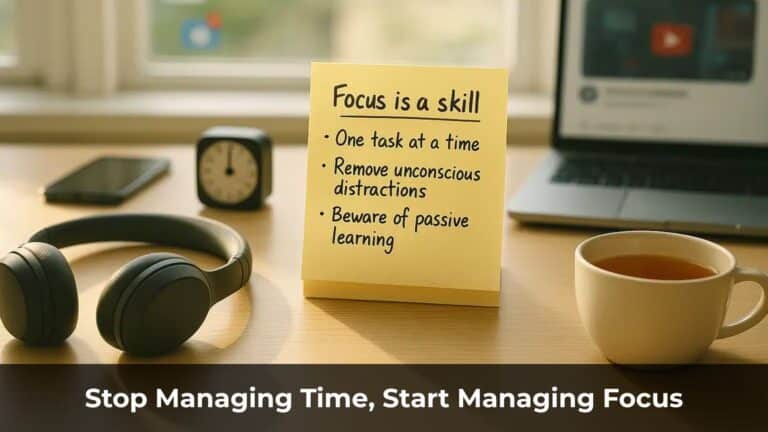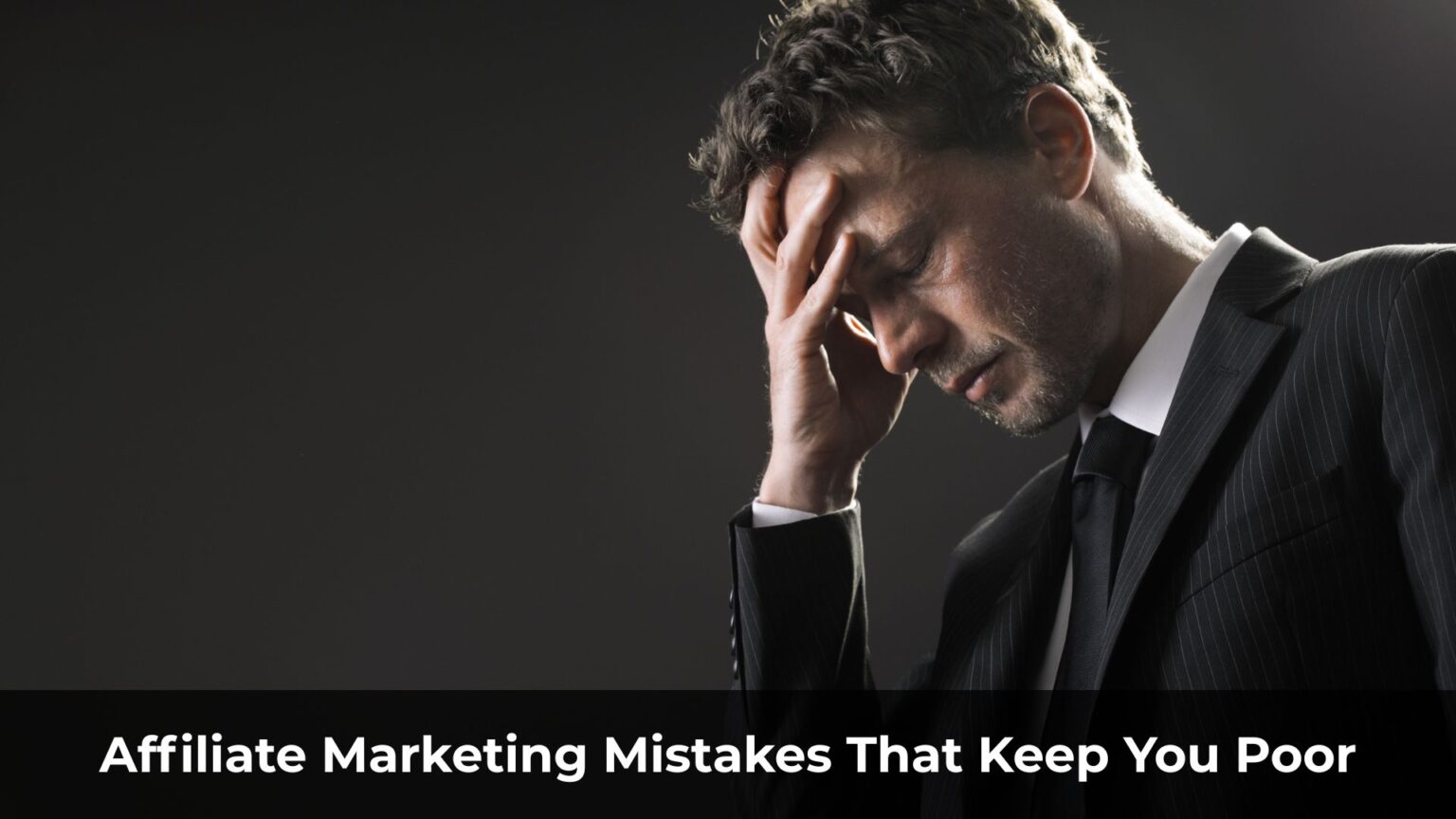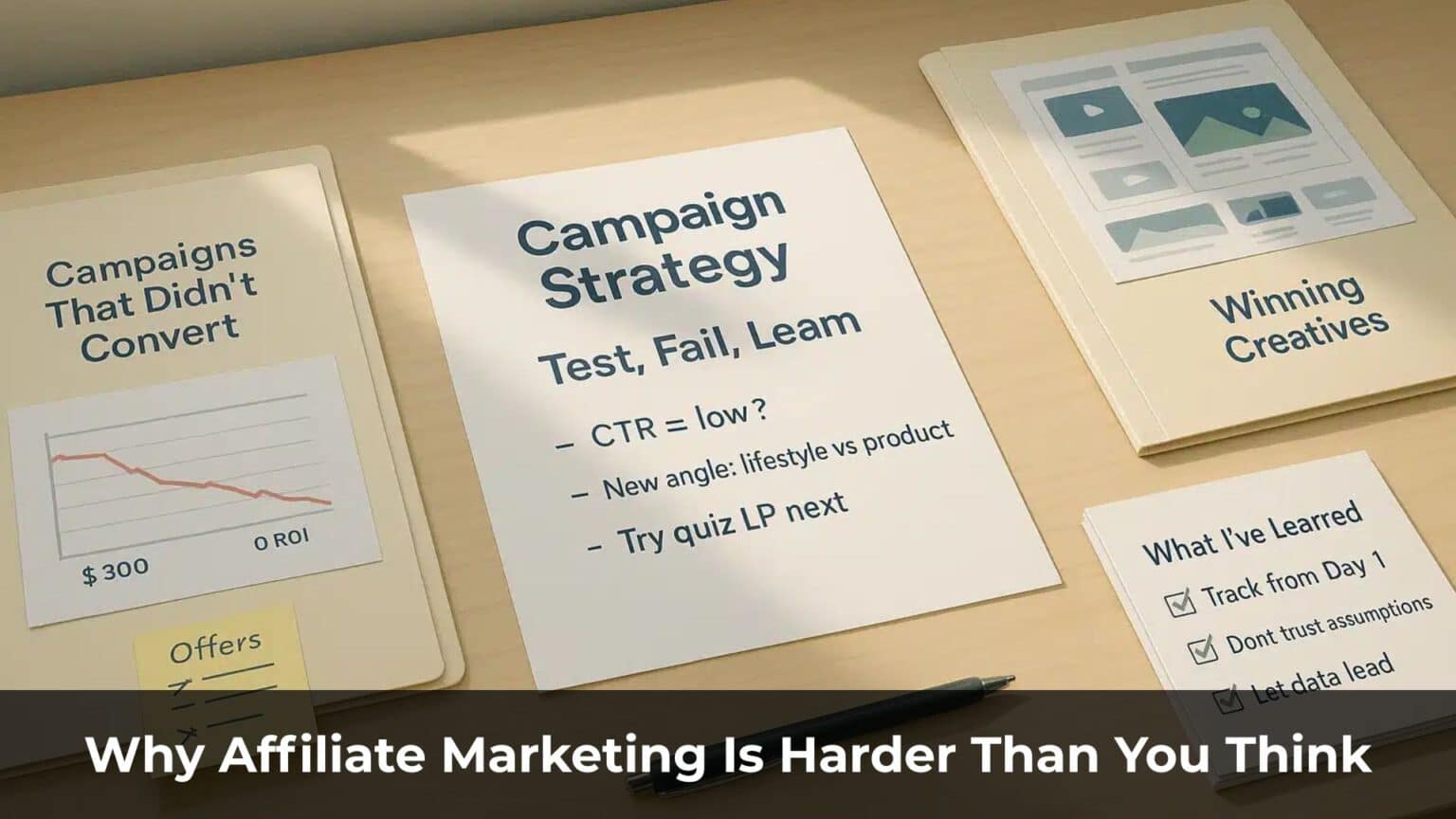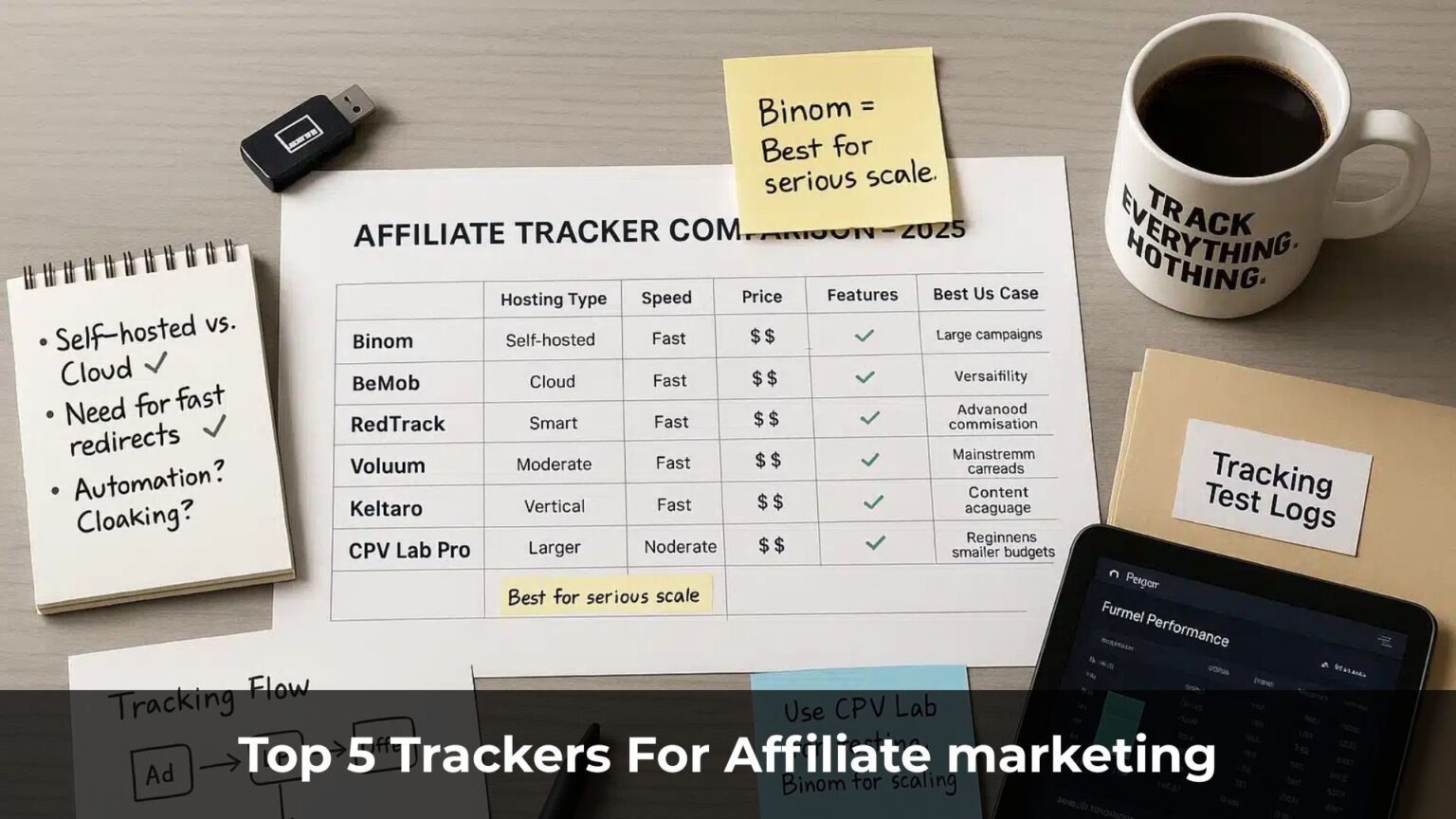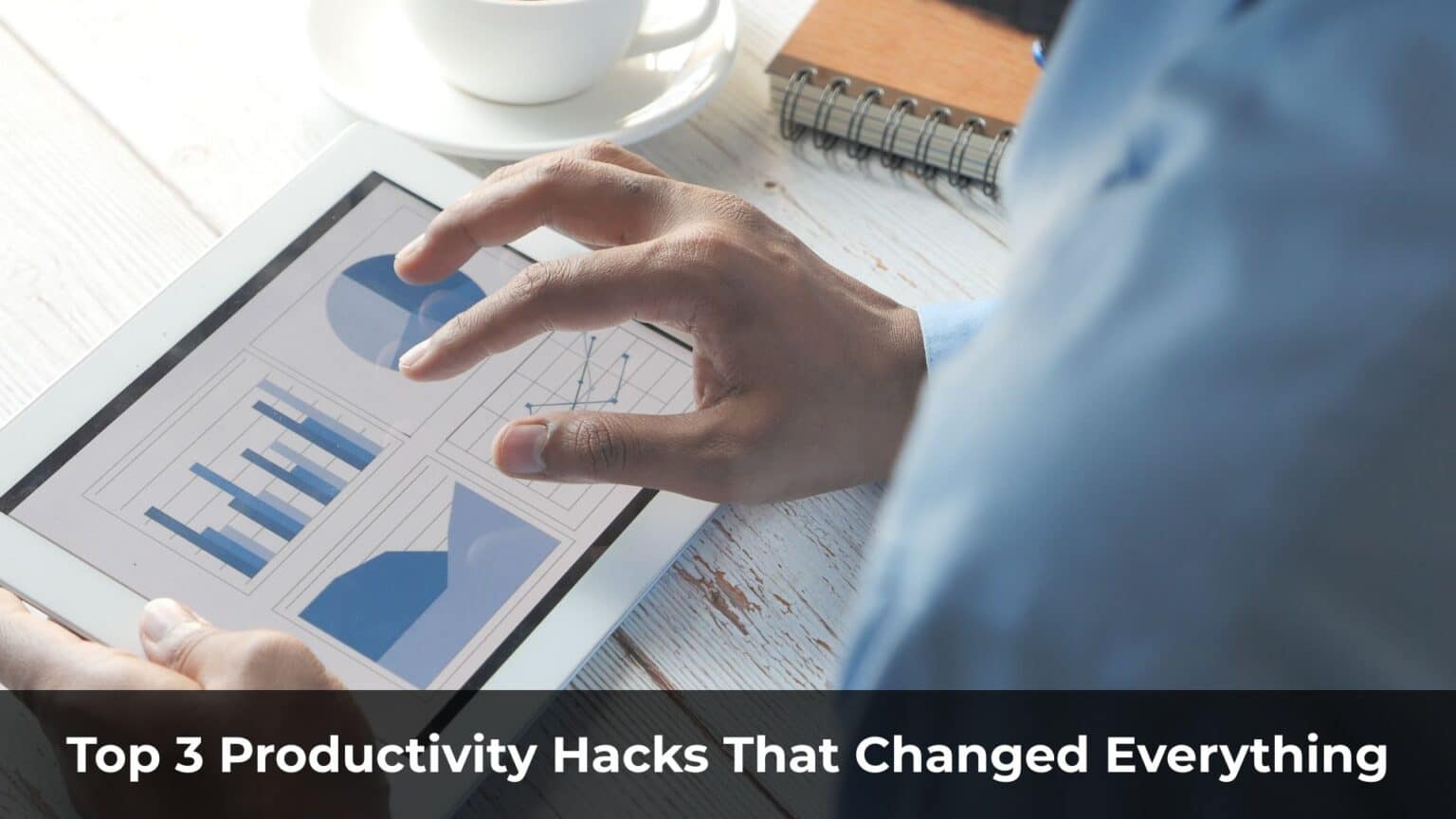Too often, affiliate marketers rush into launching campaigns — testing offers, writing ad copy, tweaking landing pages — but forget one crucial thing: strategy.
Without a clear strategy, you’re just throwing spaghetti at the wall and hoping something sticks. And while that might work once or twice, it’s not how you build sustainable profit.
In this post, I’ll share with you several high-level concepts I’ve personally used over the years to build, grow, and optimize campaigns — especially in competitive niches. These are not fluffy ideas. They’re strategic frameworks you can actually apply.
Because if you want to win in affiliate marketing, you need to think like Sun Tzu — plan before you attack, position before you spend. Otherwise, your ad budget becomes a donation.
Table of Contents
ToggleHow to Build a Profitable Affiliate Campaign (Without Relying on Luck)
You spend days researching, setting up a new campaign. You’re excited, hopeful. You start imagining all the reasons this one will finally work.
Then you launch it — and it flops.
“That offer wasn’t a good fit. I’ll try a different one. Maybe the next one will be better.”
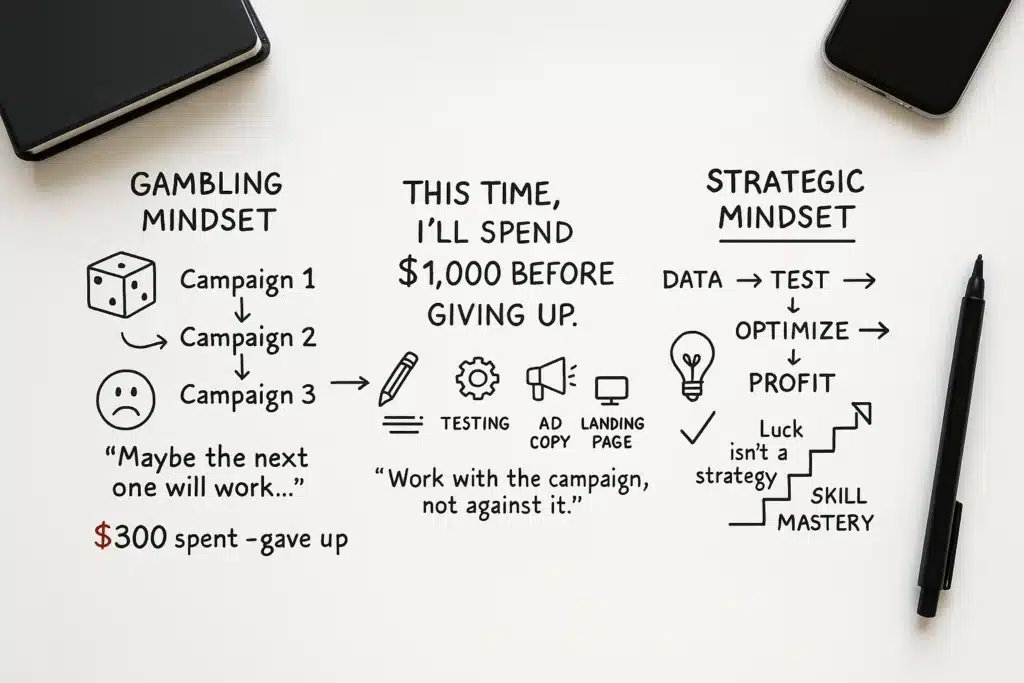
That, in a nutshell, was how I ran my first 15 affiliate campaigns. I jumped from idea to idea, always hopeful, always disappointed. I’d launch a campaign, see no results, feel the pressure mounting, shut it down, and start over again.
At one point, I told myself: “This time, I’ll spend $1,000 on a campaign before giving up.” But when I hit $300 and the campaign was still losing money, the disappointment kicked in hard.
Still, I stuck to the plan. I decided to work with the campaign, not against it. I tested more angles, wrote new ads, tried different landing pages. Eventually, that campaign became my first profitable one.
And that changed everything.
I shifted from a gambling mindset to a strategic mindset. Instead of relying on hope, I started collecting data and optimizing step by step.
The truth is, many affiliates jump from campaign to campaign, expecting instant profits. And even when they do hit something that works, it’s often luck — not skill. So they can’t replicate it. They just go back to chasing the next “magic angle.”
A few years ago, it was easy to make money with affiliate marketing. I knew people pulling in four figures a day just by copying someone else’s campaign and running Facebook ads. But when the game got harder, they couldn’t adapt. Their luck ran out.
The problem? They made money, but they never learned how to build campaigns. Luck isn’t a strategy. It can get you started — but it won’t keep you in the game.
If you’re serious about this, focus on building skill. Learn the process. And don’t confuse early wins with mastery.
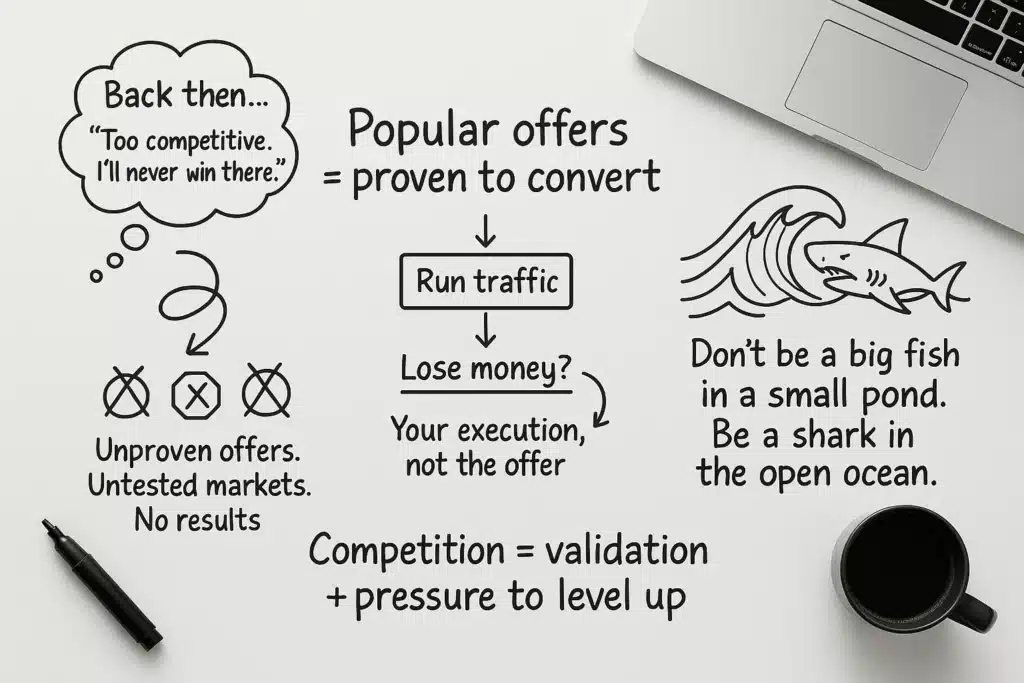
Don’t Be Afraid of Competitive Niches
When I first started, my affiliate manager suggested a few top-performing offers from their network — the ones that were bringing in serious money for other affiliates.
But I instantly backed away.
“No way,” I thought. “Those niches are way too competitive. Other affiliates have more experience, more budget — there’s no way I can make that work.”
So I kept browsing the network, endlessly searching for hidden gems — low-competition offers, untapped markets, unique angles. I launched campaign after campaign chasing that dream. Most of them failed.
Looking back, I realized one thing: the majority of those failed campaigns were targeting unproven offers. Offers that hadn’t been tested at scale. Markets that hadn’t been validated.
And here’s what I learned the hard way: the benefit of running ads for a popular offer is that it’s already proven to convert. If something is hot, that means there’s potential. If I run traffic to it and lose money, it’s not because the offer doesn’t work — it’s because I didn’t execute it properly. Others are making it work. I just have to figure out how.
Instead of chasing novelty, I started focusing on execution. Competitive niches come with greater rewards — and they force you to level up.
Competition isn’t something to avoid. It’s something to embrace.
Don’t try to be a big fish in a small pond. Become a shark in the open ocean.
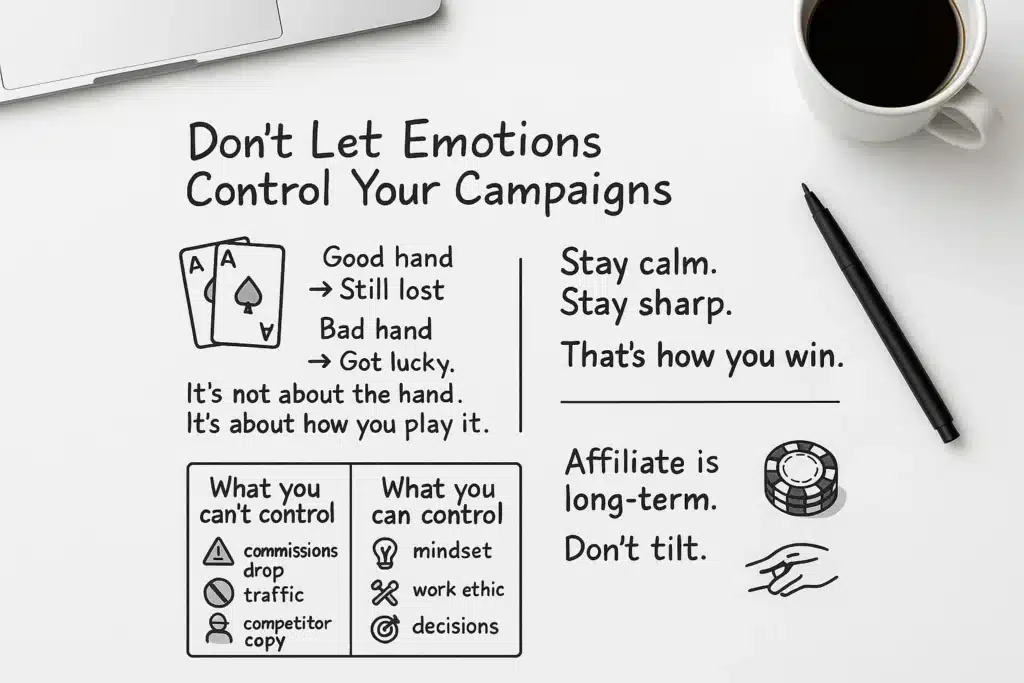
Don’t Let Emotions Take Over Your Campaign Decisions
Back when I used to play poker casually, one of the best lessons I learned wasn’t about cards — it was about emotions.
Sometimes you get a bad hand. That’s just part of the game. And sometimes, you play a great hand perfectly — only to lose to someone who played a terrible one and got lucky.
That’s when you realize: unexpected things will always happen.
The real question is, how will you respond? Will you let one bad outcome ruin your mindset for the rest of the game? Or will you stay calm, stay sharp, and keep playing your best?
Affiliate marketing is no different.
Your best campaign might suddenly stop working. Commissions drop. Advertisers shave leads. Competitors steal your ads and landing pages. New policies kill your traffic source overnight.
There will always be things outside your control.
What is in your control? Your mindset. Your response. Your work ethic.
Do the best with what you have — and don’t let the chaos rattle you. That’s how you stay in the game long enough to win.
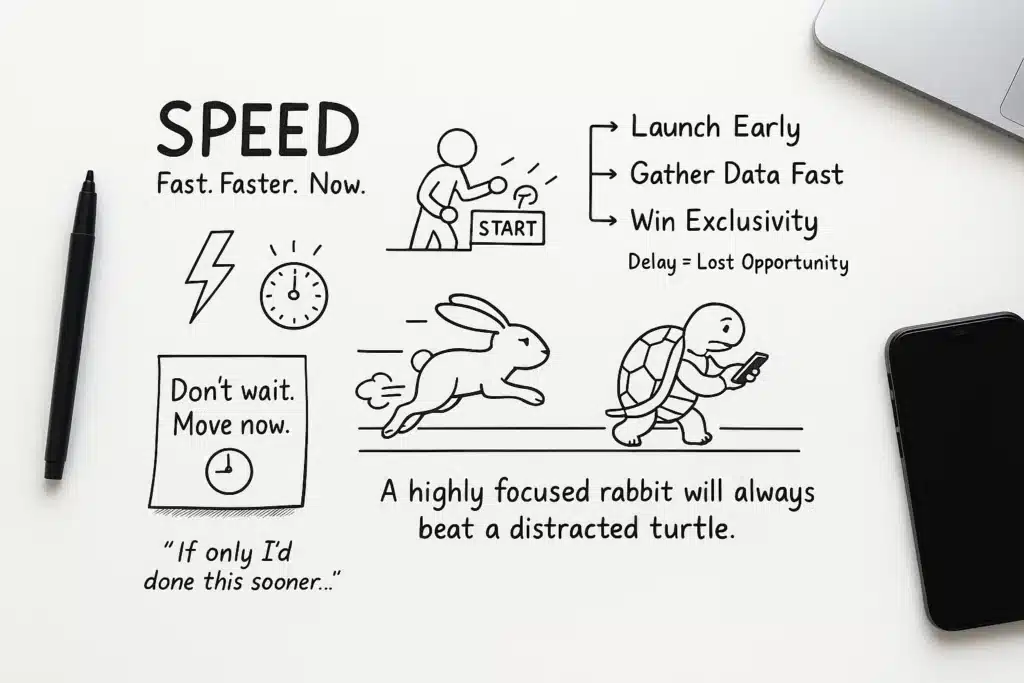
Speed. Fast. Faster. Now.
A few weeks ago, a new offer launched on the network — and it immediately caught my eye.
I jumped in on day one and started testing. Within a few days, the campaign turned profitable. Not long after, the advertiser ran out of budget for other affiliates and decided to give me full control of the offer.
Why? Because I moved fast.
I brought in leads. I brought in conversions. I gave them data. And in return, they gave me exclusivity.
If I had waited even a week to get started, someone else could’ve taken that spot. But instead, I got the hottest offer — and I had it all to myself.
Have you ever had a killer campaign idea, but kept putting it off?
You think, “I’ll launch it tomorrow… next week… maybe when I have more time.”
Then you finally launch it — and boom, it starts printing money. That’s when the regret hits: “If only I’d done this sooner… imagine how much I could’ve made.”
Here’s the truth: Success rewards speed.
When you move fast and stay focused, you outpace the competition. A highly focused rabbit will always beat a distracted turtle — no matter how consistent the turtle is.
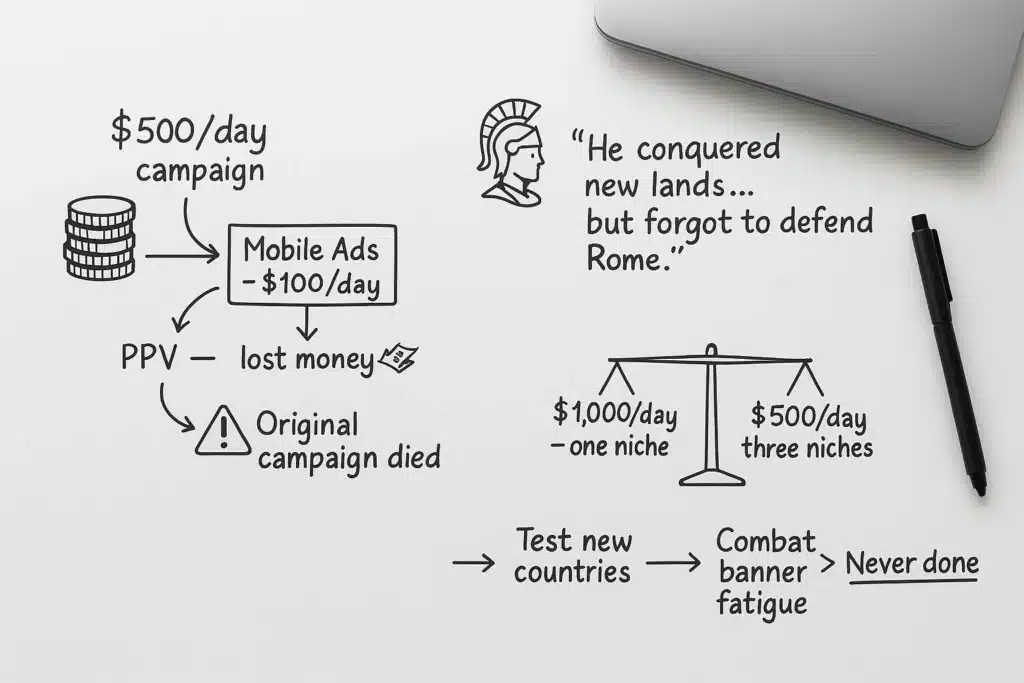
Don’t Scale Too Soon
One day, I was chatting with a fellow affiliate on Telegram. He was making $500 a day promoting adult dating offers — not bad at all.
So, what was his next move?
He wanted to diversify. He didn’t want all his eggs in one basket, so he started new campaigns in mobile marketing and PPV traffic.
What happened next?
The mobile campaign pulled in around $100/day. The PPV campaign lost money. And the original dating campaign — the one that was his bread and butter — slowly died out and dropped to zero.
Brutal, right?
It reminded me of a Roman general who spent all his time conquering new territories, but forgot to defend Rome itself. In the end, he lost the capital — and with it, all the lands he had fought so hard to gain. He returned home with nothing.
Here’s the lesson: Expansion is great, but only after you’ve mastered your core niche.
If you’re new and trying to run campaigns in three different verticals at once, you’re not being smart — you’re just splitting your focus. That’s 33% effort in each area. How can you possibly compete with someone giving 100%?
When I looked at his campaign, I saw so much untapped potential. He hadn’t even tested multiple traffic sources. There were at least ten countries he could scale into. But instead of building a system for launching fresh ad creatives or managing banner fatigue, he jumped to the next shiny thing.
With just a few more rounds of testing, that campaign could’ve hit $1,000/day — maybe even $10,000/day.
Diversification is smart — but only when you’ve already built a strong, profitable foundation. You need time, money, and experience to explore new verticals properly.
Remember this: Making $1,000/day in one niche beats making $500/day across three. Every time.
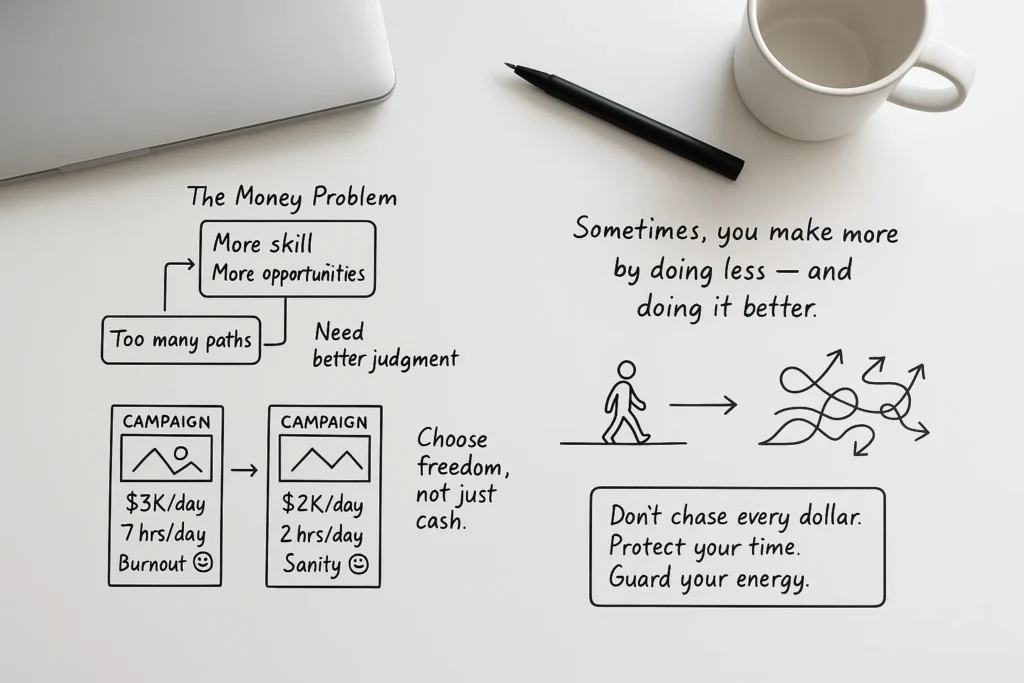
The Money Problem
As you get better at affiliate marketing, something surprising happens — you start seeing more opportunities, not fewer. And then you’re faced with a new kind of challenge:
Choosing the right opportunities.
I’ve had campaigns that made really good money. But I hated running them.
Some campaigns feel like leaky boats — you spend all day bailing water just to keep them afloat. Ten hours a day, constantly putting out fires, fixing issues, chasing problems.
I’d rather have a $2,000/day campaign that only takes two hours to manage… than a $3,000/day campaign that burns through seven hours and my sanity.
Why? Because I need time for other projects. I need time to live my life.
I’ve seen people chase money so hard they end up with nothing. They overwork themselves, burn out, lose their edge. Years of grinding — and they walk away exhausted, disconnected, no longer passionate about the game.
Sometimes, the smarter move isn’t launching more campaigns.
Sometimes, you make more money by doing less — and doing it better.
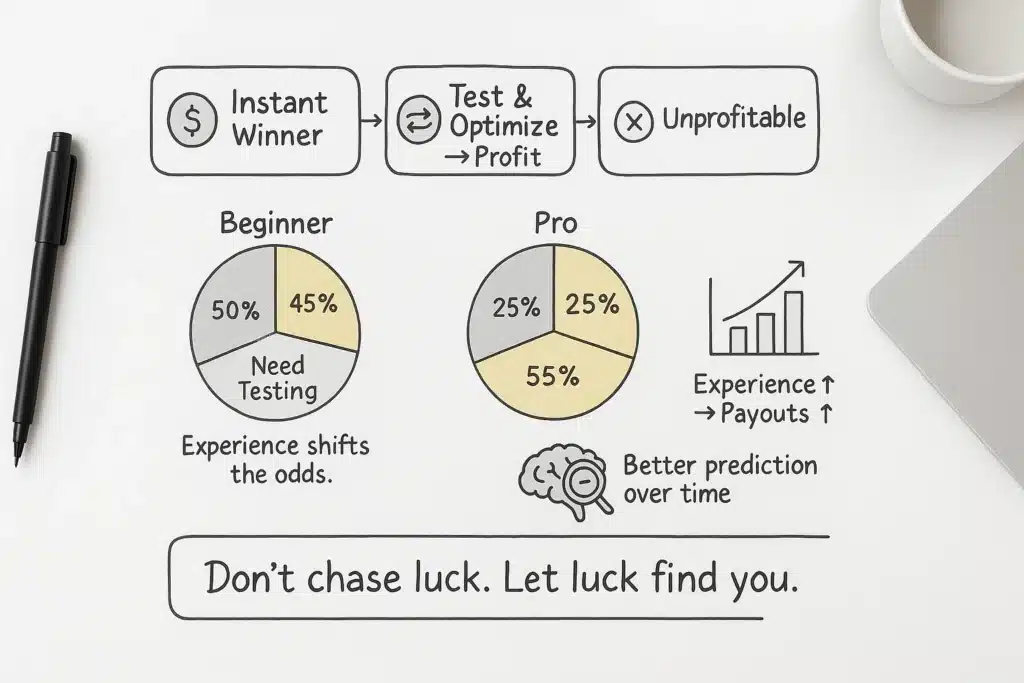
The Expected Value of a Campaign
In affiliate marketing, most campaigns fall into one of three categories:
A. The campaign is profitable right out of the gate.
B. It starts off breakeven or losing money, but becomes profitable after enough testing.
C. It never becomes profitable — either because the offer is weak, or because you’re lacking the skills or resources to make it work.
If you’re just starting out, the breakdown might look like this:
- 5% of your campaigns are instant winners.
- 45% have potential, but need proper testing and optimization.
- 50% are dead on arrival.
Go back to what I said earlier — success isn’t built on luck. Instant winners are rare. Think of them as rewards for staying in the game and launching consistently.
And the better you get, the more those rewards show up.
After a few years of serious experience, your numbers might look more like this:
- 25% instant winners.
- 55% test-and-win campaigns.
- 20% unprofitable.
Your ability to predict a winner improves. Your understanding of offers, traffic sources, creatives, and funnels gets sharper. You can often spot a high-potential campaign before you spend a dime on ads.
Hard work attracts luck.
Experienced affiliates have higher payouts, bigger budgets, and stronger networks. They’re not afraid to burn money on testing. They track their top competitors. They know which traffic converts, which angles are saturated, and when to scale.
So don’t chase luck. Work hard — and let luck find you.
Final Thoughts
Affiliate marketing isn’t just about finding the “next hot offer” or copying what’s trending. It’s about building the skillset to launch, test, analyze, and optimize — again and again.
There will be pressure. There will be losses. There will be times when campaigns fail, even after days of hard work. But if you keep your emotions in check, focus on strategic execution, and learn from every round, you’ll get better. Sharper. Stronger.
Don’t chase every niche. Don’t try to scale before you’re ready. Don’t measure success by daily profit alone.
Measure it by how well you understand the game — because once you do, the profits will follow.
Now get back to work — the next winning campaign won’t launch itself.




